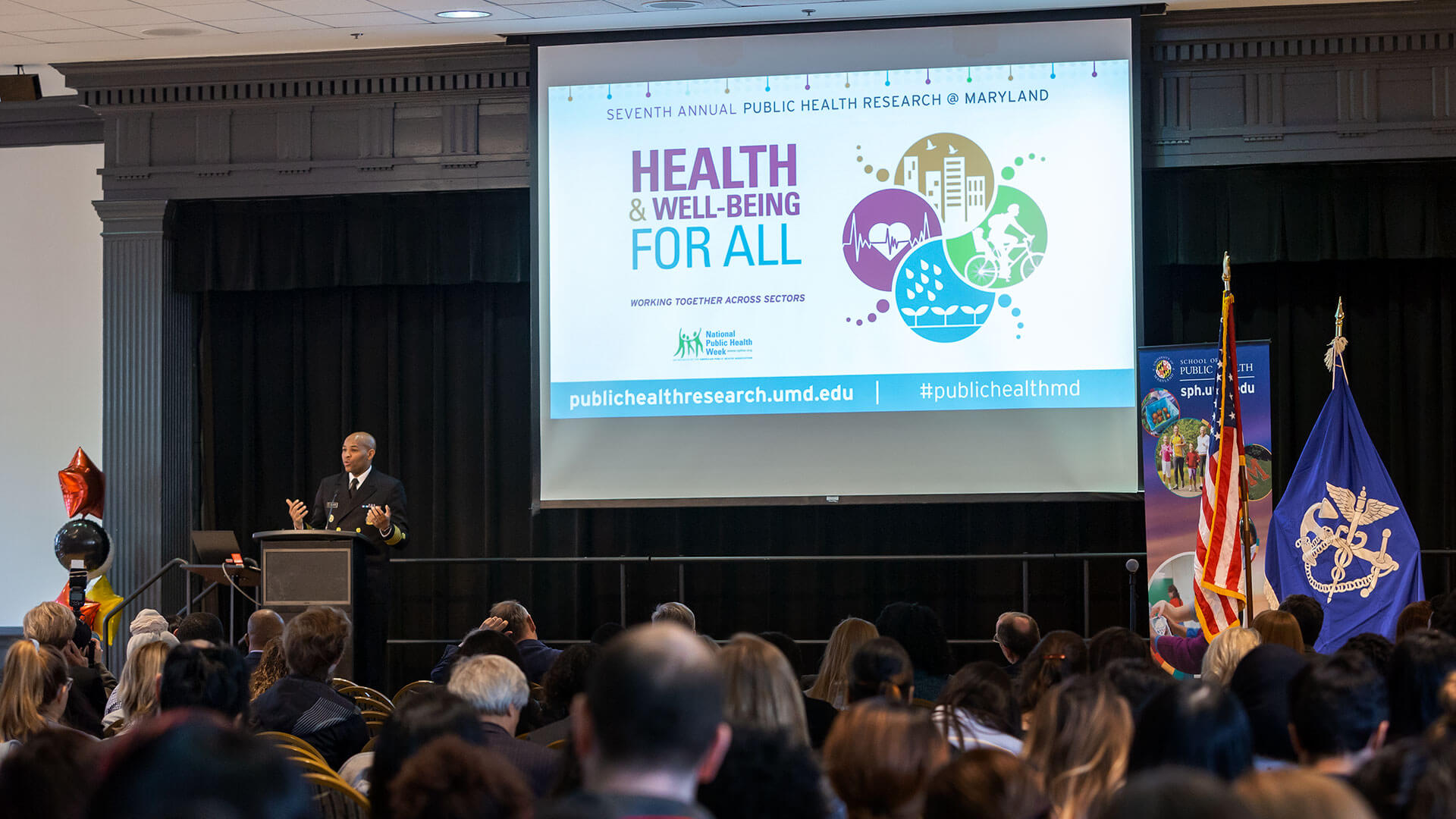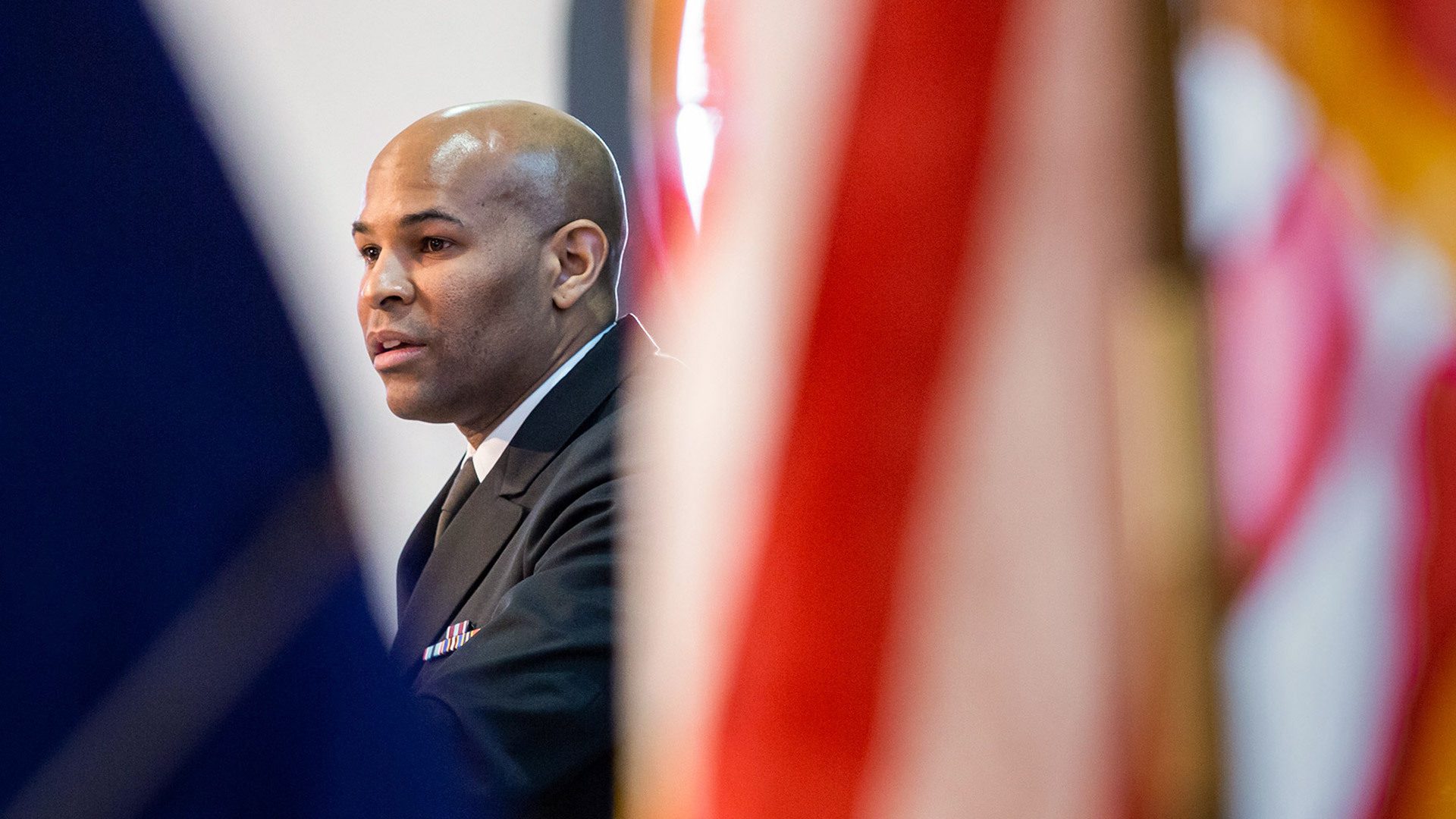- April 03, 2019
- By Kelly Blake
Dr. Jerome Adams, the U.S. surgeon general, brought a visual aid to Public Health Research at Maryland yesterday: a tube of naloxone nasal spray.
The medication is designed to rapidly reverse opioid overdose, and Vice Adm. Adams said that he carries it everywhere. Appointed to his position by President Trump in 2017—when 70,000 Americans died of drug overdoses and the U.S. Department of Health and Human Services declared a public health emergency—he is focused on helping the country to navigate the opioid crisis. He called it an opportunity.
“Five years ago, I wouldn't have been able to go to a town and get a mayor, the head of the hospital, the head of the health department, the schools superintendent, the sheriff and CEO of the biggest business to talk about any health issue,” he said. “But now I can go to any community in America and bring all those people together to talk about the opioid epidemic.”
Adams gave the keynote address at the event that drew more than 600 students, faculty, staff and community partners for a showcase of research and panels on topics including sustainability, health technology and violence prevention at the Stamp Student Union.
Since 2013, Public Health Research at Maryland day has been a partnership between the University of Maryland School of Public Health and the University of Maryland School of Medicine’s Department of Epidemiology and Public Health, made possible with funding from the University of Maryland Strategic Partnership: MPowering the State.
Yesterday’s event, featuring an array of panels on topics including sustainability in food, water and energy; health technology; and violence and human trafficking; saw broad participation from the College Park and Baltimore campuses as well as from area universities including the University of Maryland, Baltimore County and Johns Hopkins, Georgetown, Morgan State, Towson, American and George Washington universities.
School of Public Health Dean Boris Lushniak, a retired rear admiral in the U.S. Public Health Service and former deputy and acting surgeon general, welcomed these and other partners from county health departments, federal health agencies and area hospital and health care systems who also came to learn about opportunities for “working together across sectors to promote health and well-being for all.”
Echoing this theme, Adams said that it is critical that public health professionals partner with those outside of the health sphere. He talked about how the opioid epidemic has been an opportunity for him to bring together diverse sectors of society to not just confront the crisis, but to address health broadly, including the “upstream” factors that may impact drug addiction, including mental health, traumatic childhood experiences, poverty and more.
In addition to opioid addiction and other substance use (including vaping and marijuana), Adams also emphasized two other priorities: making the connection between investing in health and how it impacts economic prosperity and the links between health and safety and security.
“The No. 1 issue people vote on is jobs and the economy so we need to translate what we’re selling into a language that resonates with folks,” he said. “The No. 2 issue that people vote on is safety and security. If we can frame health in terms of how it makes us a safer, more secure nation or community, we’ll get more people paying attention.”
“Dr. Adams gave an example of Amazon moving into Northern Virginia because it is an area with a healthy workforce,” said senior public health science major Jordan Kerr, who leads the student group Public Health Action for Civic Engagement. “The idea of partnering with major corporations or other nontraditional fields to promote health was something I never considered before and led me to really think out of the box when considering different public health issues.”
Because health is largely driven by factors that have nothing to do with health care, such as affordable housing, jobs, access to transportation and healthy food, Adams urged “public health folks” to have the courage bring partners like business leaders, police officers, school administrators and faith leaders to the table to truly impact health.
Topics
Campus & CommunityUnits
School of Public Health